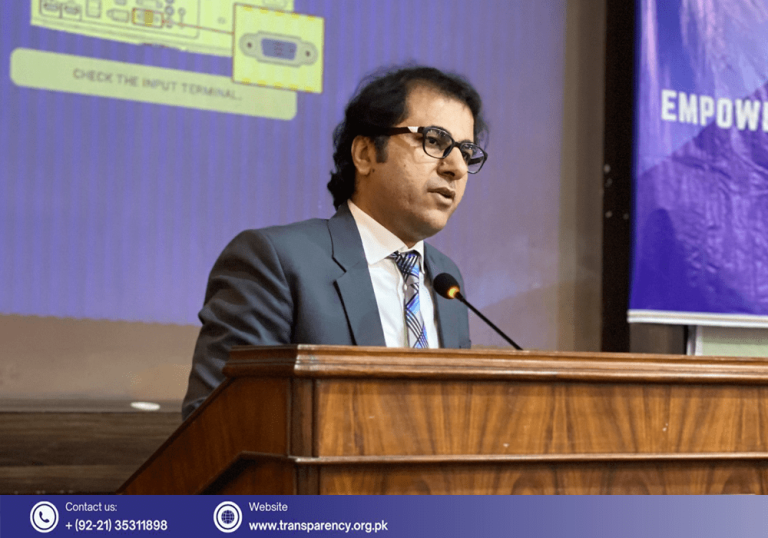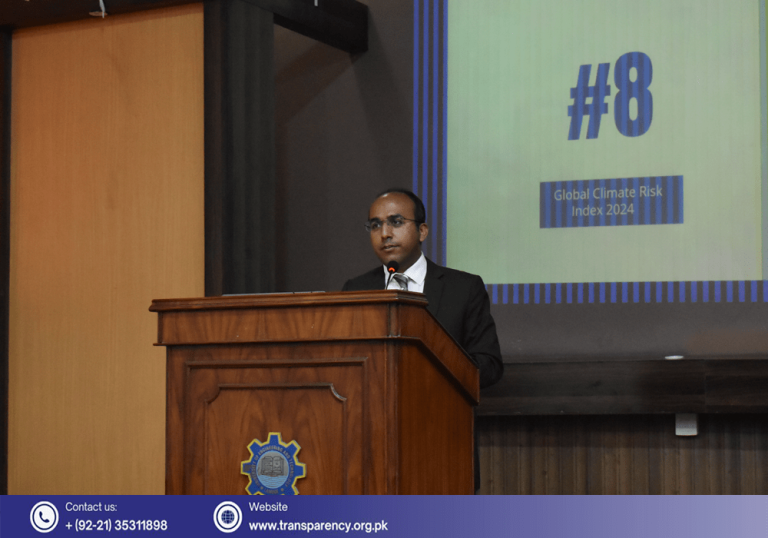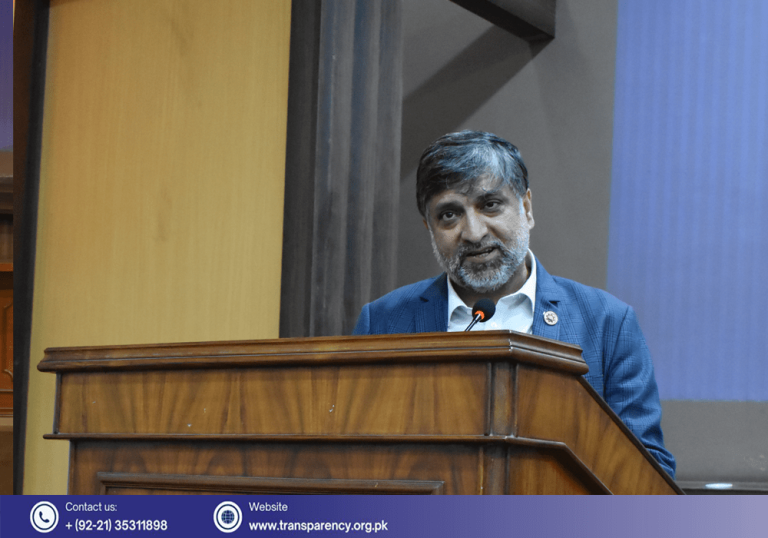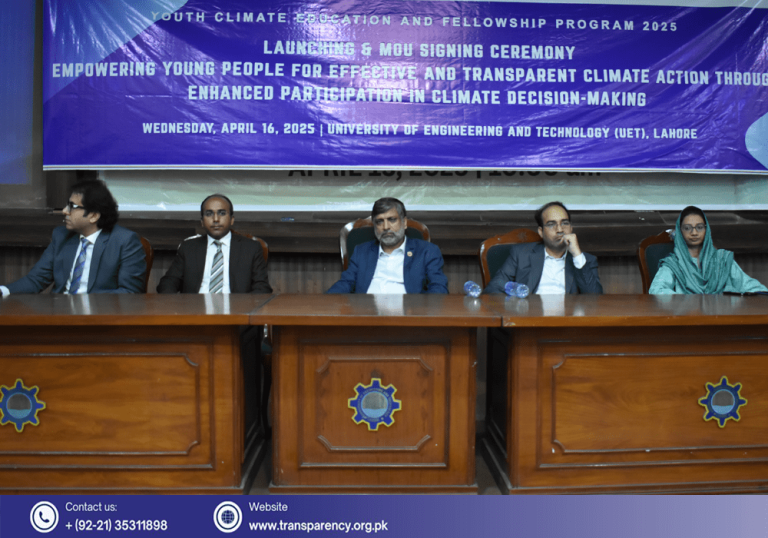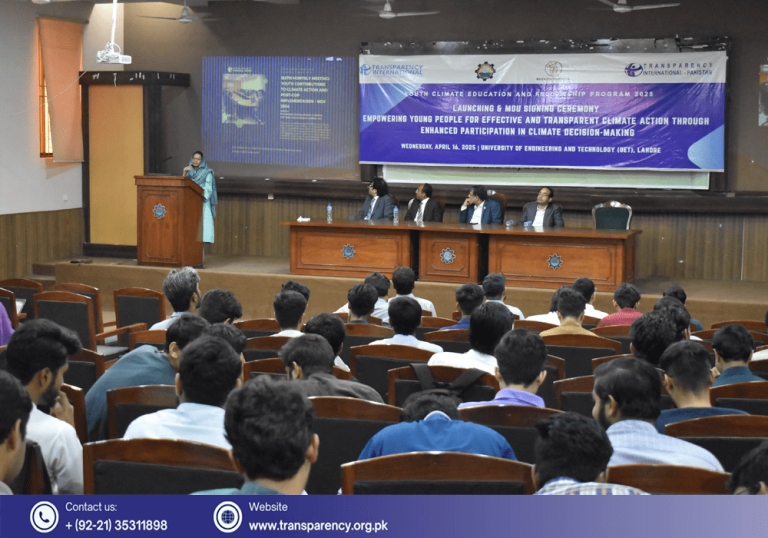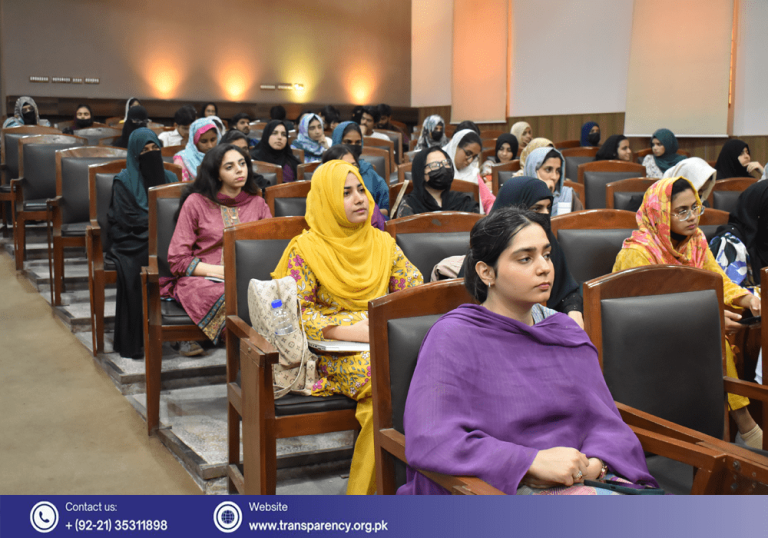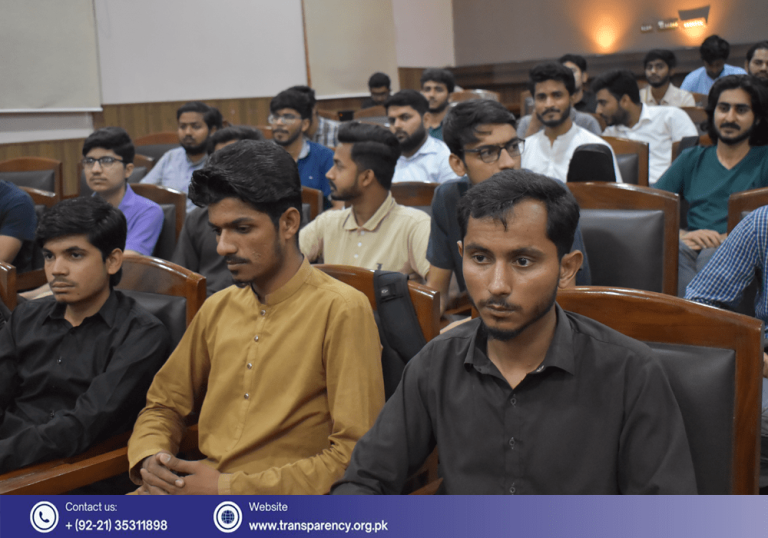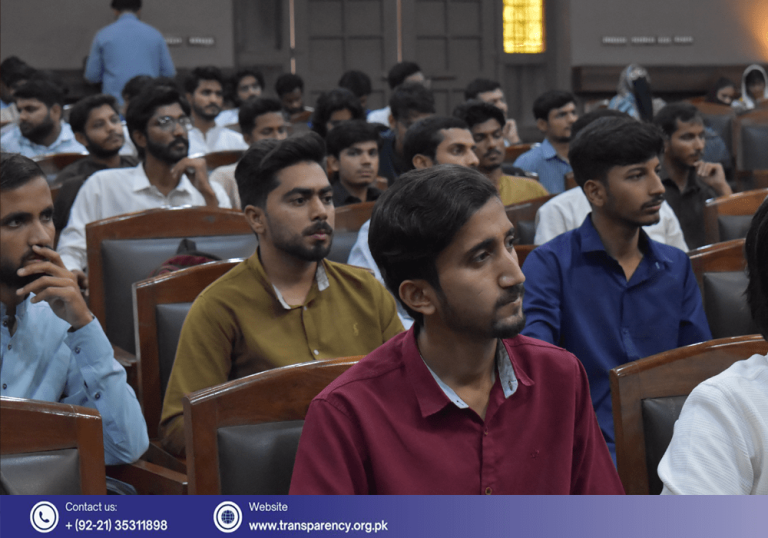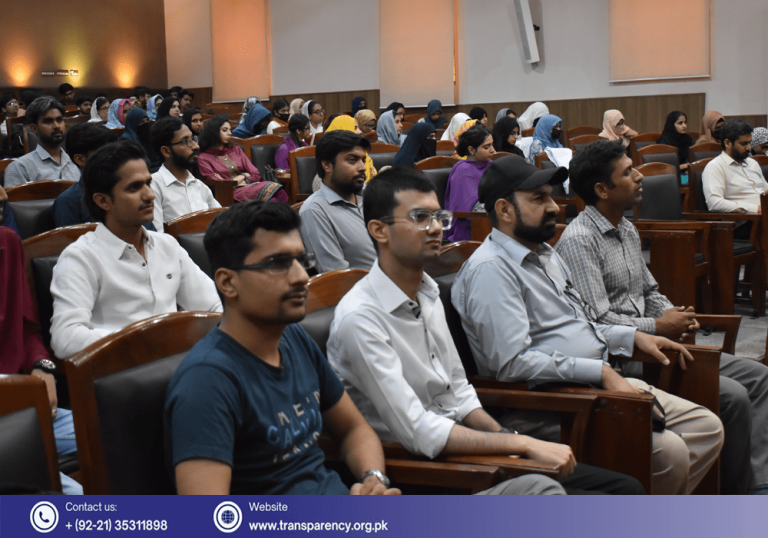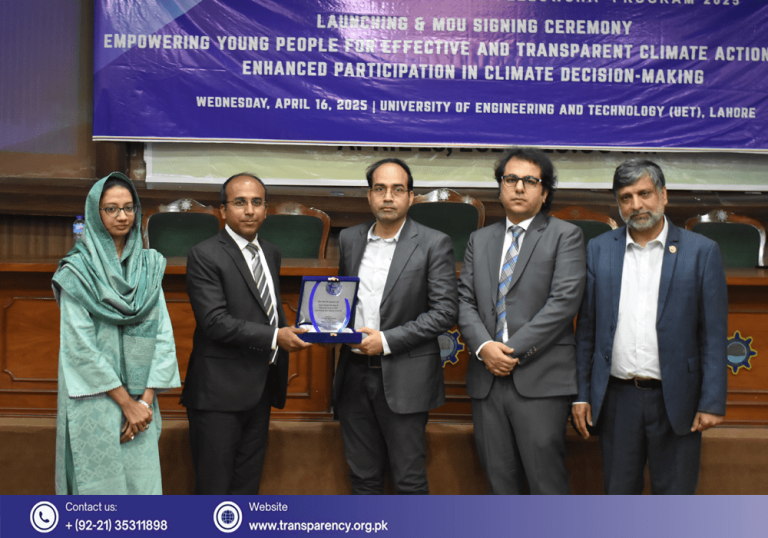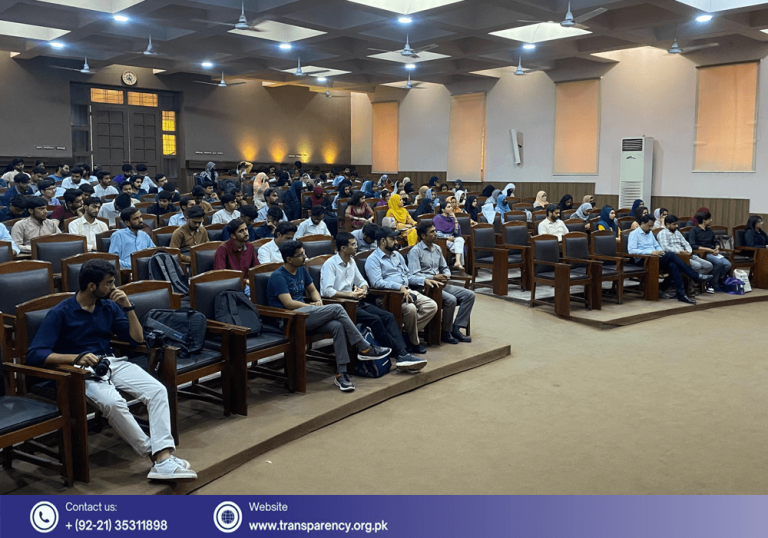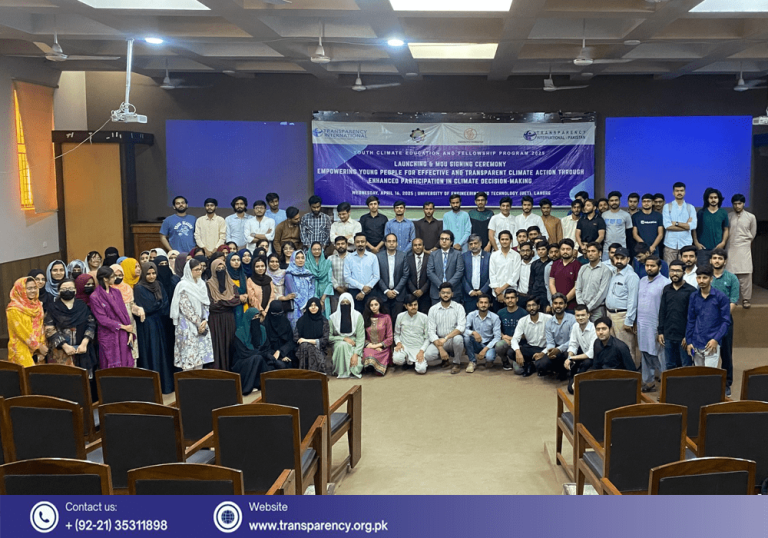Launching Ceremony of Youth Climate Education and Fellowship Program 2025: Empowering Young People for Effective and Transparent Climate Action through Enhanced Participation in Climate Decision-Making
Launching Ceremony of Youth Climate Education and Fellowship Program 2025: Empowering Young People for Effective and Transparent Climate Action through Enhanced Participation in Climate Decision-Making
Venue: Department of Transportation Engineering and Management, University of Engineering and Technology (UET), Lahore
Date: Wednesday, April 16, 2025
Transparency International Pakistan has launched Youth Climate Education and Fellowship Program 2025 in collaboration with University of Engineering and Technology (UET), Lahore.
The launching ceremony was held following the signing of a Memorandum of Understanding (MoU) between both institutions. The event marked a significant step toward empowering young people to participate effectively and transparently in climate decision-making processes at local and national levels. Around 130 students from different departments including Environmental Sciences, Environmental Engineering, Chemical Engineering, Software Engineering, Product and Industrial Design, Transportation Engineering, Chemical, Polymer, and Composite Material Engineering, Transportation Engineering and Management and Civil Engineering and faculty members attended the ceremony. This marks the third Youth Climate Education and Fellowship Program launched by Transparency International Pakistan. Previously, similar programs were successfully initiated at the University of Peshawar and Shaikh Ayaz University, Shikarpur.
The Youth Climate Education and Fellowship Program 2025 aims to educate and empower university students with in-depth knowledge of climate change, governance, and social accountability, enabling them to actively participate in climate policy advocacy and leadership. The program aims to nurture a new generation of youth leaders committed to transparent and sustainable climate action.The event formally started with recitation of Holy Quran, followed by welcoming remarks, delivered by Prof. Dr. Naveed Ramzan, Dean Faculty of Chemical, Metallurgical & Polymer Engineering, UET, Lahore.
Prof. Dr. Naveed Ramzan, expressed his gratitude to TI Pakistan for launching this much-needed initiative. In his welcoming remarks, he emphasized the critical role of youth in addressing the climate crisis and appreciated the collaboration with Transparency International Pakistan. He highlighted UET’s commitment to promoting climate-conscious leadership through academic engagement and innovation.
Next, Mr. Kashif Ali, Executive Director, TI Pakistan, delivered opening Remarks. He highlighted the importance of engaging youth in transparent climate governance. He emphasized that empowering young people with knowledge and leadership opportunities is essential for driving sustainable climate action and ensuring accountability in policy implementation.
Following the opening remarks, a video was screened showcasing the Climate Governance Innovation Challenge held at the University of Peshawar. The video highlighted innovative climate action projects and youth-led initiatives developed under the fellowship program at the University of Peshawar, serving as an inspiring model for the newly launched fellowship at UET, Lahore.
Moving forward, Ms. Fariha Fatima, Programme and Procurement Associate at Transparency International Pakistan, delivered a presentation on the Youth Climate Education and Fellowship Program 2025, providing an overview of its objectives, structure, and session details. She outlined that he fellowship has the following objectives:
- Enhance Climate Change Knowledge
- Build Policy Skills
- Strengthen Social Accountability
- Empower Youth Leadership in Climate Action
These objectives are pursued across the focus areas of Educational Enhancement, Skill Development, Policy Participation, Youth Empowerment, and Social Accountability in Climate Action. She also provided an overview of the program structure, including key modules such as climate change mitigation and adaptation, climate finance, carbon markets, and disaster risk management. Ms. Fariha highlighted how the fellowship is designed to promote critical thinking, leadership, and youth-led climate action through workshops, mentorship, and interactive learning.She also shared key highlights from the successful implementation of the 2024 fellowship at the University of Peshawar, which included. Notably, students organized a Local Conference of Youth (LCOY), providing a platform for young voices to contribute to climate discourse at the national level. Some fellows had the opportunity to participate in COP29 in Baku, Azerbaijan, highlighting Pakistan’s climate challenges and emphasizing the importance of youth inclusion in global climate diplomacy.
Next, Mr. Kashif Ali, Executive Director, TI Pakistan delivered a presentation on Youth led Climate Action and Punjab Climate Change Policy. He highlighted the crucial role young people play in addressing climate change, particularly at the grassroots level. Youth-led initiatives are important because they promote local empowerment, promote grassroots innovation, and contribute to collective impact. He emphasized the importance of education and awareness, resilience building, sustainable development, inclusivity, and policy influence as key areas for youth involvement. Mr. Ali also discussed the climate governance legal framework in Pakistan, noting the distinction between adaptation and mitigation strategies, with examples like China’s renewable energy expansion and EU carbon pricing. He stressed the growing role of youth in governance through formal structures like youth councils, policy input mechanisms, and global platforms such as COP. While the Punjab Climate Change Policy 2024 has laid down important policy directions, he emphasized that legislative backing and implementation remain gaps. Mr. Ali concluded by stating that youth-led action is as critical as expert knowledge, and called for systematic monitoring and government support to overcome persistent barriers and scale up youth-driven climate initiatives in Pakistan.
Lastly, Dr. Izzat Iqbal Cheema, Associate Professor, Department of Chemical, Polymer and Composite Materials Engineering UET Lahore, led the session on youth climate action plans. He outlined the next steps of the fellowship, informing participants that application forms would soon be released, and 40 fellows would be selected through a competitive process. He also announced that an Innovation Challenge would be held as part of the program, encouraging students to develop creative and impactful climate solutions. The session concluded with an open discussion, where students shared their ideas and enthusiasm for contributing to climate action.

